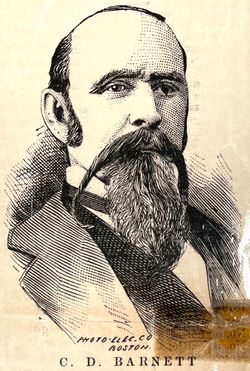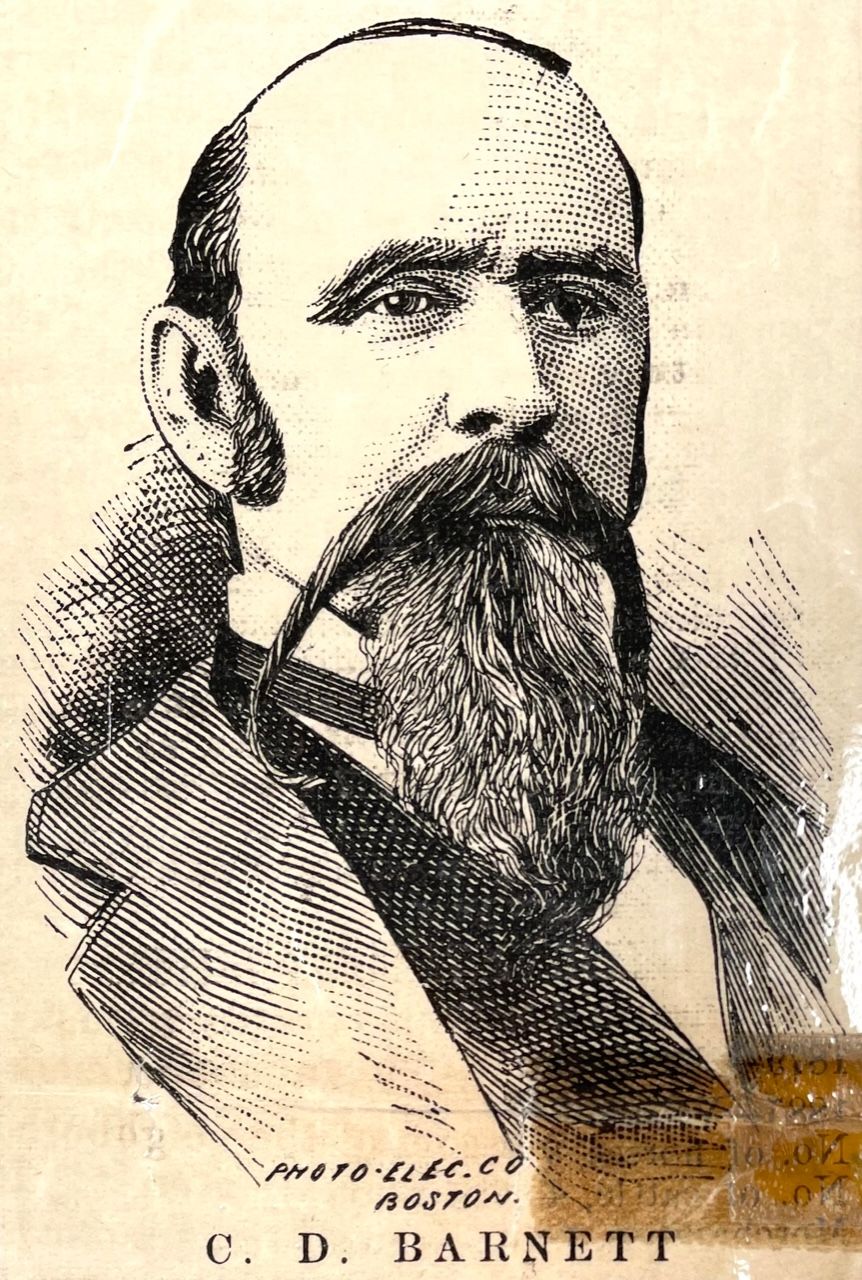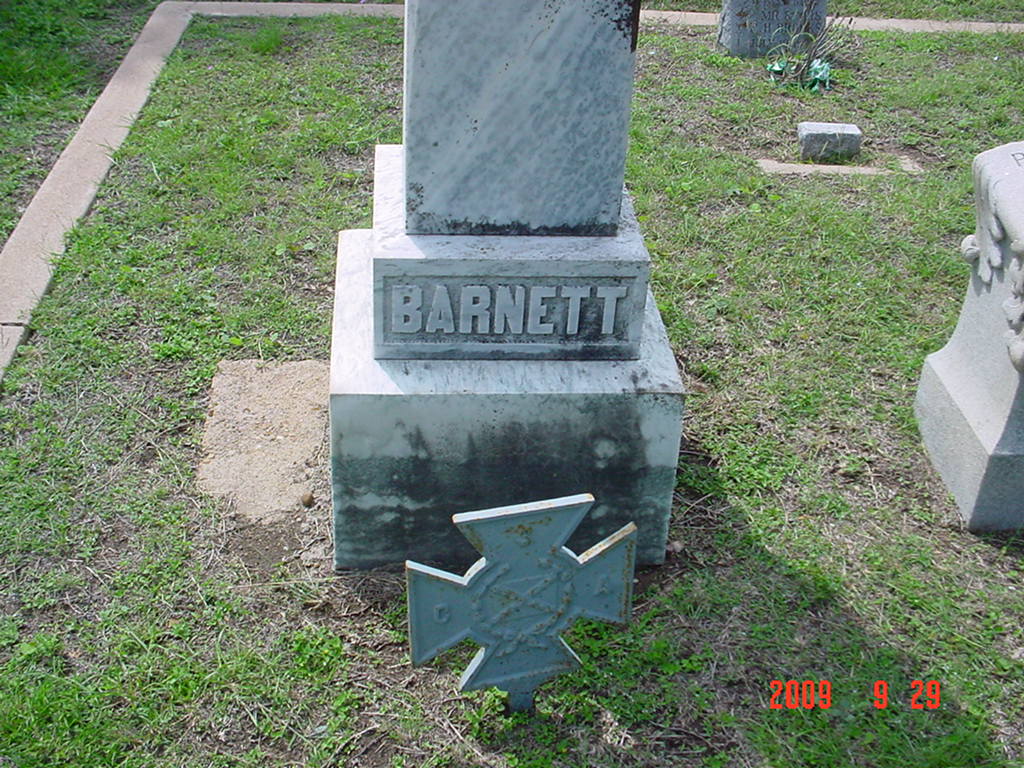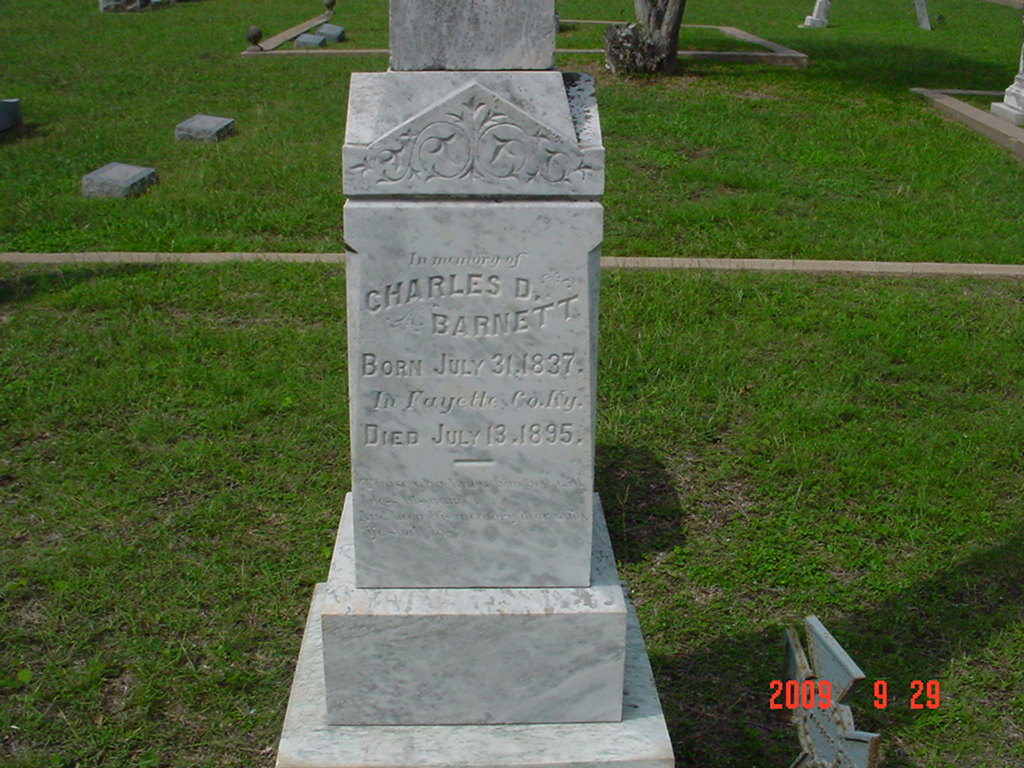Judge C. D. Barnett departed this life at his residence in Weimar at about 2 o'clock p. m., last Saturday, the 13th instant. He died of a stomach trouble, which he thought was dyspepsia, but which proved to be a more serious trouble, and about which the doctors, in the last stages of his sickness, were not entirely agreed. His health had been very bad for several months, but he was able to be on his feet and to walk about town and to visit his neighbors and friends occasionally to within a few days of his death. After he took his bed his vital forces failed rapidly, and it quickly spread throughout the community that Charley Barnett, as he was familiarly called here, was bound to die, and that within a very few days. His hospitable premises were constantly thronged with anxious friends and inquirers. All was done for him that could be done. Able physicians exhausted their skill, and he was nursed day and night with the tenderest care. The inevitable could not be averted, and though the minds of his friends were prepared for the worst, it was a shock to all when the news speedily flew that he was dead.
There is a strange something in the human heart called hope that survives every disaster except death; and even then its lingering, dying whisperings softly tell us that perhaps death was for the best. In this instance the writer believes it was for the best--not for the living, I mean, but for the one that is dead to us. If there is a heaven that the preachers tell about (and I do not doubt it), I believe that Charley Barnett has gone there. As true as the needle to the pole, as self-sacrificing in spirit as a Spartan soldier, kind and generous and charitable to all, he was a noble specimen of humanity On the bloody fields of Shiloh, Murfreesboro, Chickamauga, Missionary Ridge, and in other pitched battles that shook America from center to circumference, he bravely did his soldier's duty beneath the bullet-pierced battle flag of Terry's Texas rangers. A member of the Methodist church from his earliest manhood he constantly strived to do his whole christian duty; if any one was sick or in distress he was a prompt and ready volunteer for assistance; if there was any plausible public movement for the common good he was among the foremost in it. The great apostle said in effect, "though I have all these and have not charity, I am nothing." Charley Barnett had all these, and charity for his fellowmen and love for God and religion and duty were his prominent characteristics.
Rev. J. W. Harmon, the good Methodist pastor who stood over the corpse of the subject of this sketch at the mourning home of he departed one last Sunday afternoon and, in the presence of a large assembly of friends, conducted religious services, told of the noble, religious character of Charley Barnett in a far more able manner than I could.
After these religious services the Masonic lodge of Weimar, of which he had been a member for many years, assisted by the lodges of Schulenburg, Oakland, and Columbus,took charge of the remains and buried them in the Odd Fellows' cemetery at this place, being followed to the graveyard by a very long procession.
Charley Barnett had the distinction of being the first inhabitant of Weimar. He and his noble wife, nee Miss Prudie Smalley, were the first to settle in the town limits when this place was laid off for a town and a station in 1873 by the "Sunset" railroad company. They have resided here ever since, except for five years, from June 27th, 1890 to June 27th, 1895. During this period they were in Austin, where Judge Barnett was filling the office of superintendent of the confederate Home. He took charge of the Home the 1st of July, 1890, when it was a private institution, having been appointed superindent[sic] by the managing board. The following year the Home became a state Institution, and Gov. Hogg appointed him superintendent under state management Feb. 1st, 1891, and he remained in this position, filling it with credit and honor to himself and the state, till the close of Gov. Hogg's second administration, in January 1895. When he retired from this office he at first thought of remaining permanently in Austin, but in June last, he concluded to return to his former Weimar home, which he had claimed as his legal residence while superintendent of the Home, and where he invariably came to vote at elections. The opinion of the writer is that he had despaired of ever recovering his health, and he preferred to die at his loved home in Weimar and among his many true and tried friends of earlier years.
He had creditably filled offices of honor and trust before, and had he lived and recovered his health no doubt higher political positions would have been thrust upon him.
He was born at Newtown, Scott county, Ky., the 31st day of July, 1873[sic], and would have been 58 years old the last day of this month. He was 12 years old when his then widowed mother moved to Texas, and settled at LaGrange. After a year or two the family moved permanently to this, Colorado county.
His only child, a daughter to whom he was tenderly devoted, died when she was only a few years old, and years afterwards he would sometimes weep at the mention of her name.
His wife, to whom he was devoted, survives him. Though a woman of superior determination and forcible character, she is overwhelmed with grief. The company of her amiable niece, Miss Prudie Taylor, who lives with her, seems to be her greatest solace. Her husband left her well provided for in insurance policies on his life and otherwise, which is a great blessing to her.
His aged mother, Mrs. Mary A. Ward, still lives, is a resident of Weimar, is in good health, and has the prospects of many more days on this earth.
Tears have welled to the writer's eyes while writing this article, and his heart melts in sympathy for his wife, mother, and other bereaved ones.
H. C. QUIN.
Weimar, Texas, July 17th, 1895
Weimar Mercury, July 20, 1895
************
BARNETT, C. D.
C. D. Barnett was born in Fayette County, Ky., July 31, 1837; moved to Fayette county, Texas, in 1849; was deputy sheriff of Fayette county in 1860. The war between the states coming on, he enlisted in Terry's Texas Rangers, 8th Texas Cavalry, in 1861, served in that command throughout the war, doing his duty faithfully and well, having been slightly wounded three times. In 1895 he returned from the war to Colorado county and August 10, 1865, married Miss Prudence Smalley. In 1873 the family moved to Weimar and enjoy the distinction of being the first family to locate in that active and flourishing little city, where they still reside. Mr. Barnett is justice of the peace express agent, a member of several benevolent societies, the versatile and wide-awake correspondent at Weimar of the Citizen, a faithful laborer in the Master's vineyard, and it is a common expression to hear the other citizens say: "We can't get along without Charley Barnett," from which the truth is forcibly presented that he always "acts well his part, there all the honor lies." Genial in disposition, with a heart overflowing with kindness for humanity, a hand every ready to assist in distress, he would adorn the honored citizenship of any land. (The Colorado Citizen, Columbus, Tex, Oct 22, 1889 )
Judge C. D. Barnett departed this life at his residence in Weimar at about 2 o'clock p. m., last Saturday, the 13th instant. He died of a stomach trouble, which he thought was dyspepsia, but which proved to be a more serious trouble, and about which the doctors, in the last stages of his sickness, were not entirely agreed. His health had been very bad for several months, but he was able to be on his feet and to walk about town and to visit his neighbors and friends occasionally to within a few days of his death. After he took his bed his vital forces failed rapidly, and it quickly spread throughout the community that Charley Barnett, as he was familiarly called here, was bound to die, and that within a very few days. His hospitable premises were constantly thronged with anxious friends and inquirers. All was done for him that could be done. Able physicians exhausted their skill, and he was nursed day and night with the tenderest care. The inevitable could not be averted, and though the minds of his friends were prepared for the worst, it was a shock to all when the news speedily flew that he was dead.
There is a strange something in the human heart called hope that survives every disaster except death; and even then its lingering, dying whisperings softly tell us that perhaps death was for the best. In this instance the writer believes it was for the best--not for the living, I mean, but for the one that is dead to us. If there is a heaven that the preachers tell about (and I do not doubt it), I believe that Charley Barnett has gone there. As true as the needle to the pole, as self-sacrificing in spirit as a Spartan soldier, kind and generous and charitable to all, he was a noble specimen of humanity On the bloody fields of Shiloh, Murfreesboro, Chickamauga, Missionary Ridge, and in other pitched battles that shook America from center to circumference, he bravely did his soldier's duty beneath the bullet-pierced battle flag of Terry's Texas rangers. A member of the Methodist church from his earliest manhood he constantly strived to do his whole christian duty; if any one was sick or in distress he was a prompt and ready volunteer for assistance; if there was any plausible public movement for the common good he was among the foremost in it. The great apostle said in effect, "though I have all these and have not charity, I am nothing." Charley Barnett had all these, and charity for his fellowmen and love for God and religion and duty were his prominent characteristics.
Rev. J. W. Harmon, the good Methodist pastor who stood over the corpse of the subject of this sketch at the mourning home of he departed one last Sunday afternoon and, in the presence of a large assembly of friends, conducted religious services, told of the noble, religious character of Charley Barnett in a far more able manner than I could.
After these religious services the Masonic lodge of Weimar, of which he had been a member for many years, assisted by the lodges of Schulenburg, Oakland, and Columbus,took charge of the remains and buried them in the Odd Fellows' cemetery at this place, being followed to the graveyard by a very long procession.
Charley Barnett had the distinction of being the first inhabitant of Weimar. He and his noble wife, nee Miss Prudie Smalley, were the first to settle in the town limits when this place was laid off for a town and a station in 1873 by the "Sunset" railroad company. They have resided here ever since, except for five years, from June 27th, 1890 to June 27th, 1895. During this period they were in Austin, where Judge Barnett was filling the office of superintendent of the confederate Home. He took charge of the Home the 1st of July, 1890, when it was a private institution, having been appointed superindent[sic] by the managing board. The following year the Home became a state Institution, and Gov. Hogg appointed him superintendent under state management Feb. 1st, 1891, and he remained in this position, filling it with credit and honor to himself and the state, till the close of Gov. Hogg's second administration, in January 1895. When he retired from this office he at first thought of remaining permanently in Austin, but in June last, he concluded to return to his former Weimar home, which he had claimed as his legal residence while superintendent of the Home, and where he invariably came to vote at elections. The opinion of the writer is that he had despaired of ever recovering his health, and he preferred to die at his loved home in Weimar and among his many true and tried friends of earlier years.
He had creditably filled offices of honor and trust before, and had he lived and recovered his health no doubt higher political positions would have been thrust upon him.
He was born at Newtown, Scott county, Ky., the 31st day of July, 1873[sic], and would have been 58 years old the last day of this month. He was 12 years old when his then widowed mother moved to Texas, and settled at LaGrange. After a year or two the family moved permanently to this, Colorado county.
His only child, a daughter to whom he was tenderly devoted, died when she was only a few years old, and years afterwards he would sometimes weep at the mention of her name.
His wife, to whom he was devoted, survives him. Though a woman of superior determination and forcible character, she is overwhelmed with grief. The company of her amiable niece, Miss Prudie Taylor, who lives with her, seems to be her greatest solace. Her husband left her well provided for in insurance policies on his life and otherwise, which is a great blessing to her.
His aged mother, Mrs. Mary A. Ward, still lives, is a resident of Weimar, is in good health, and has the prospects of many more days on this earth.
Tears have welled to the writer's eyes while writing this article, and his heart melts in sympathy for his wife, mother, and other bereaved ones.
H. C. QUIN.
Weimar, Texas, July 17th, 1895
Weimar Mercury, July 20, 1895
************
BARNETT, C. D.
C. D. Barnett was born in Fayette County, Ky., July 31, 1837; moved to Fayette county, Texas, in 1849; was deputy sheriff of Fayette county in 1860. The war between the states coming on, he enlisted in Terry's Texas Rangers, 8th Texas Cavalry, in 1861, served in that command throughout the war, doing his duty faithfully and well, having been slightly wounded three times. In 1895 he returned from the war to Colorado county and August 10, 1865, married Miss Prudence Smalley. In 1873 the family moved to Weimar and enjoy the distinction of being the first family to locate in that active and flourishing little city, where they still reside. Mr. Barnett is justice of the peace express agent, a member of several benevolent societies, the versatile and wide-awake correspondent at Weimar of the Citizen, a faithful laborer in the Master's vineyard, and it is a common expression to hear the other citizens say: "We can't get along without Charley Barnett," from which the truth is forcibly presented that he always "acts well his part, there all the honor lies." Genial in disposition, with a heart overflowing with kindness for humanity, a hand every ready to assist in distress, he would adorn the honored citizenship of any land. (The Colorado Citizen, Columbus, Tex, Oct 22, 1889 )
Family Members
Advertisement
Records on Ancestry
Advertisement










